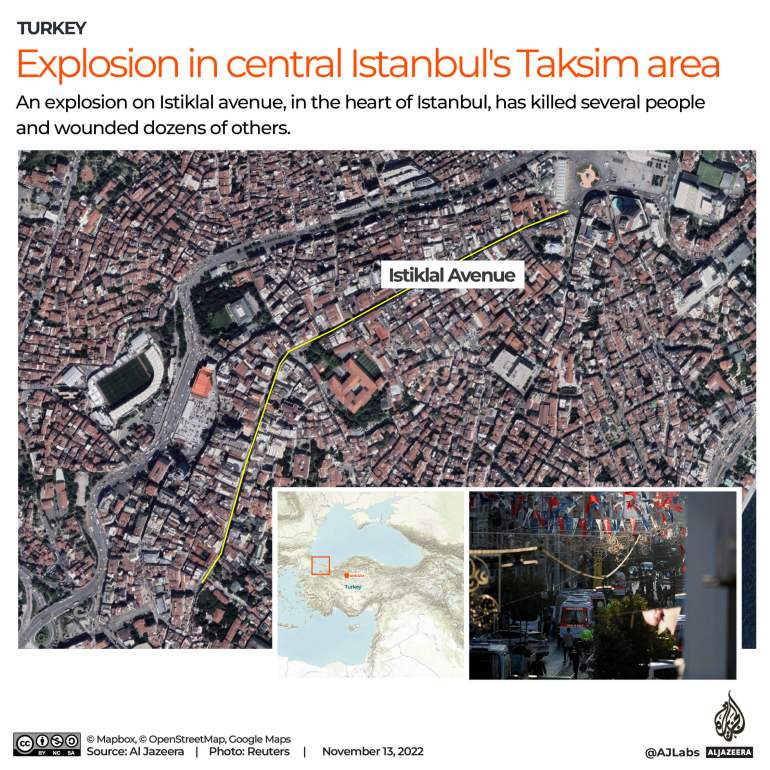
Police have arrested a suspected attacker for allegedly planting the bomb that exploded on a bustling pedestrian avenue in Istanbul, Turkey’s interior minister has said, adding that initial findings indicate that Kurdish fighters were responsible for the deadly attack.
At least six people were killed and several dozen others were wounded in Sunday’s explosion on Istiklal Avenue, a popular thoroughfare lined with shops and restaurants that leads to the iconic Taksim Square.
“A little while ago, the person who left the bomb was detained by our Istanbul Police Department teams,” the Anadolu Agency quoted Interior Minister Suleyman Soylu as saying on Monday. He did not identify the suspect but said 21 other people were also detained for questioning.
Soylu said of the 81 people who were hospitalised, 50 were discharged. Five of the wounded were receiving emergency care and two of them were in life-threatening condition, he said.
Who is responsible?
- Soylu said the evidence pointed to the perpetrators being from the Kurdistan Workers’ Party (PKK) and to what Turkey says is its Syrian offshoot, the Democratic Union Party (PYD). He said the attack would be avenged.
- He said security forces believe that instructions for the attack came from Kobane (Ayn al-Arab), the majority Kurdish city in northern Syria that borders Turkey.
- On Sunday, Justice Minister Bekir Bozdag told pro-government broadcaster A Haber that investigators were focusing on a woman who sat on a bench by the scene of the blast for about 40 minutes. The explosion took place just minutes after she left.
- On Monday, Istanbul’s police said the woman arrested was Syrian, and had entered Turkey from the Syrian region of Afrin. The police added that she had been trained by Kurdish forces.
- However, the PKK issued a statement in which it denied involvement in the attack, and expressed its condolences.

What is the PKK?
- The PKK, a designated “terrorist” group in Turkey, the European Union, and the United States, took up arms against the Turkish state in 1984. The conflict has killed tens of thousands of people since then.
- Tens of thousands of people have died in Turkey as a result of the conflict between the Turkish state and the PKK, with the PKK and its offshoots carrying out numerous attacks on military, security forces and civilians, and Turkey conducting operations in southeastern parts of the country with the aim of forcing the PKK out.
- Turkey was hit by a string of deadly bombings between 2015 and 2017, some by ISIL (ISIS), and others by Kurdish fighters who seek increased autonomy or independence.
- Following those attacks, which left more than 500 civilians and security personnel dead, Turkey launched cross-border military operations into Syria and northern Iraq against Kurdish fighters, while also cracking down on Kurdish politicians, journalists and activists at home.
What could Turkey do next?
- In recent years, Turkey has launched many cross-border military operations with the aim of defeating Kurdish-led forces the Turkish government considers “terrorist” organisations.
- Earlier this year, Turkey said it was going to begin a new military operation in northern Syria, with the aim of establishing what it called a “safe zone” along the entirety of the Turkey-Syria border. However, that operation has so far not gone ahead, with Russia and Iran expressing their opposition.
- The US-backed Syrian Democratic Forces (SDF) is led by the People’s Protection Units (YPG), which is the Syrian offshoot of the PKK.
- Further violence could affect the presidential and parliamentary elections scheduled for June 2023. Support for President Recep Tayyip Erdogan coalesced after a previous wave of attacks in 2015 and 2016. “This attack, if followed by others, could result in the electorate swinging to the right and consolidating around the security candidate. This is what happened the last time – Turkey went through a series of terror attacks in 2015,” said Soner Cagaptay, senior fellow at the Washington Institute.
Additional reporting from Paul Benjamin Osterlund in Istanbul.







